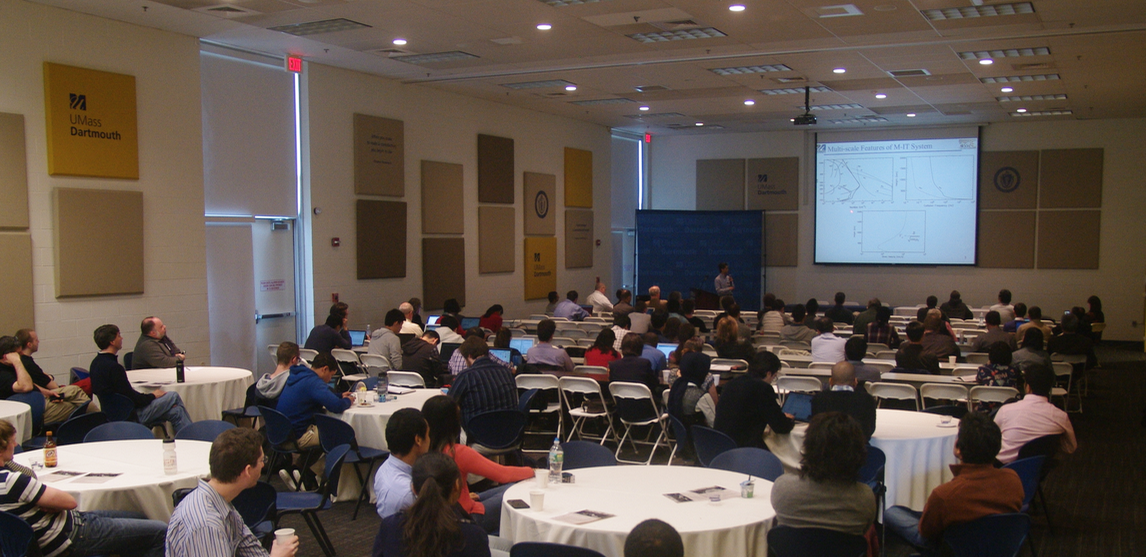
Read this story at UMass Dartmouth’s Center for Scientific Computing & Visualization Research news
Today, major advances in nearly all types of science and engineering are aided by computation. Indeed, high-performance computing (HPC) or supercomputing is now considered as the third pillar of scientific discovery alongside experiment and theory. Massachusetts universities (both public and private) excel in this emerging area and have a strong and diverse group of computational scientists and engineers across each campus.
UMass Dartmouth’s Center for Scientific Computing & Visualization Research (CSCVR) organized and hosted “HPC Day 2016” on May 17th — a conference to showcase compute intensive research from researchers in this community from all over Massachusetts. There were participants from: Northeastern University, Boston University, MIT, UMass Amherst, Dartmouth & Lowell and even industry. A special poster session with awards for student projects was included as well. This conference was a follow-on event from the inaugural “UMass HPC Day” conference hosted at UMass Dartmouth in 2014.
The event featured a total of 11 talks with topics ranging from engineering microbial systems to renewable energy extraction from the ocean. Over 120 attendees participated in this event in total and 30 student posters were presented. More details on the program may be found on the CSCVR website. Six awards were granted that were made possible via generous donations by Nvidia, SIAM and MathWorks. The conference lunch was sponsored by Microway Inc.
The keynote speaker was Dr. Jeremy Kepner from MIT Lincoln Lab who gave an fascinating and deeply engaging lecture titled “Interactive Supercomputing for High Performance Data Analysis.” The event also featured an interactive Education Panel that included stakeholders from industry and academia to discuss issues associated with HPC education and training.
The CSCVR also used this event to debut a new innovative, prototype supercomputer built entirely of mobile-devices (in particular, Nvidia Tegra X1 components used to build tablets) dubbed “Elroy”. The system’s total compute capacity is 16 Tflop/s and consumes just over 300W total power. The unique feature of this 32-node system is its extremely high power efficiency -- an order-of-magnitude larger than traditional systems. This was made possible by leveraging recent, very significant power-efficiency related advances that have been cleverly engineered into current cell phones and other mobile devices (to prolong battery life). Power-efficiency is a limiting feature in large scale supercomputing as well, due to the expense associated to large power consumption and corresponding cooling requirements. Elroy demonstrates a unique approach towards potentially meeting this challenge. This project was a result of a collaborative effort between the CSCVR and UMass Dartmouth CITS. The CSCVR has a history of developing innovative supercomputers from using gaming consoles to more recently, using video-gaming graphics cards.
The CSCVR provides undergraduate and graduate students with high quality, discovery-based educational experiences that transcend the traditional boundaries of academic fields, and foster collaborative research in the computational sciences. The CSCVR's computational resources are being utilized to solve complex problems in the sciences ranging from the modeling of ocean waves to uncovering the mysteries of black hole physics.
Please check the conference webpage fore more details including sample pictures of the day.
Story Image: 2016 HPC Day - Image credit: Helen Hill for MGHPCC